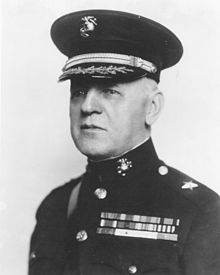Dion Williams | |
|---|---|
 Brigadier General Dion Williams | |
| Nickname(s) | Father of Marine amphibious reconnaissance[1] |
| Born | December 18, 1869 Williamsburg, Ohio, U.S. |
| Died | December 11, 1952 (aged 82) National Naval Medical Center, Bethesda, Maryland, U.S. |
| Buried | |
| Allegiance | |
| Service/ | |
| Years of service | 1893–1934 |
| Rank | |
| Commands held | 10th Marine Regiment 2nd Provisional Marine Brigade 4th Marine Regiment Assistant Commandant of the Marine Corps |
| Battles/wars | Spanish–American War |
| Awards | Navy Distinguished Service Medal |
Brigadier General Dion Williams (December 15, 1869 – December 11, 1952) was an officer in the United States Marine Corps. He was the sixth assistant commandant of the Marine Corps from August 1, 1925 – July 1, 1928. During his early career, Williams pioneered the first conceptual study of amphibious reconnaissance in the United States and becoming one of the strongest advocates in having the Marine Corps assume the amphibious, expeditionary role. During his career, he fought guerrillas in the Philippines and Dominican Republic during the Spanish–American War.
Williams is credited in the persuasion of Admiral Dewey in 1907 to assert Congress that "a force of 5,000 Marines with a Fleet" would have ensued the Philippine–American War following the Spanish defeat.[2] This 'force' was the first of the doctrinal sequence of the establishment of the Advanced Base Force, its titulage American Expeditionary Force and subsequently its modern namesake, Fleet Marine Force.
Williams retired from the Marine Corps in 1934, spending the rest of his life in Maryland.
- ^ Daugherty, Leo J. III. "Away All Boats: The Army–Navy Maneuvers of 1925" (PDF). Joint Forces Quarterly (Autumn/Winter 1998–99): 107–113. Archived from the original (PDF) on 2012-04-07. Retrieved 2008-11-30.
Marine Brigadier General Dion Williams ... emphasized that the most essential factor in an amphibious landing was to 'get men and matériel ... on the beach in the shortest possible time with the least confusion and in the best condition for immediate action. ... It is therefore vital that every effort should be made to provide beforehand suitable means ...'
- ^ Krulak, Victor H. (1951). First to Fight: An Inside View of the U.S. Marine Corps. Simon & Schuster. ISBN 0-671-73012-6.
© MMXXIII Rich X Search. We shall prevail. All rights reserved. Rich X Search
